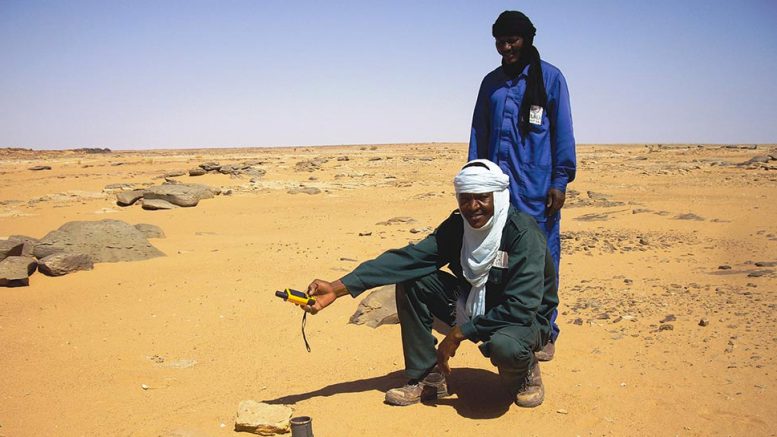The global uranium industry is bracing for potential fallout from a recent military coup in Niger, accounting for about 5% of global nuclear fuel production.
Several miners active in Niger issued updates this week, reassuring investors and stakeholders the situation was under control and their operations remained largely unaffected.
GoviEx Uranium (TSXV: GXU), which in September last year released a feasibility study on its Madaouela project in Niger, on Monday confirmed that its operations there are proceeding without interruption, with its employees safe and the communities where they operate undisturbed. It was quick to imply that should the situation become untenable, it has an international presence and could quickly leave.
“Whilst we are dedicated to Niger, it is important to note that GoviEx is an international company with a diverse portfolio of projects. Our advanced mine-permitted uranium project in Zambia is operating as normal, showcasing our global presence and operational resilience,” the company said in a news release.
Global Atomic (TSX: GLO), another emerging player in the Niger uranium mining sector, declared Monday that its entire team in the country is safe, and normal business operations are continuing. The company’s Dasa project is progressing, with substantial underground development and preparations for mining operations said to be well underway.
In a note on Monday, Canaccord Genuity mining analyst Katie Lachapelle said Niger currently produces about 6 million pounds of uranium oxide yearly and is set to see this position increase with developments at the Madouela and Dasa projects.
“Niger supplies about 15% of France’s uranium needs and accounts for one-fifth of the European Union’s (EU) total uranium imports,” said Lachapelle.
But while the uranium industry faces mounting uncertainties after last week’s coup against Niger’s democratically elected president, Mohamed Bazoum, the geopolitical turmoil has done little to move the spot price.
According to market research firm and consultancy UxC, the uranium spot price rose to US$56.25 per lb. on Monday, up from US$56.15 a week earlier. While the price has doubled over the past three years, it remains far below its peak of US$140 in 2007.
The political crisis in Niger has sparked international concern, leading to travel and economic sanctions against the impoverished West African nation.
The coup deepened the political crisis in the country. Following the seizure of power by the junta, senior politicians, including the mines minister, were detained on Monday, Bloomberg reports. In response, the West African regional economic body, ECOWAS, announced sanctions against Niger and urged the junta to reinstate the ousted president within one week.
The United States had over the weekend threatened the junta that its support for the Western African nation will dry up unless President Bazoum was released and returned to power. Niger has benefited from hundreds of millions of dollars worth of U.S. military aid and counterterrorism training and has been hosting about 1,100 U.S. troops.
Geopolitical instability has been brewing in the region for some years. Southwestern neighbour Burkina Faso saw two coups in 2022. More than 40% of that country, also a former French colony, is currently outside government control. Thousands have been killed, and about 2 million people have been displaced by fighting since 2015, when an insurgency that began in Mali in 2012 spread to Burkina Faso and other countries in the Sahel region, south of the Sahara Desert.
Amid concerns for the uranium industry, Niger’s stability in the mining sector has been notable over the last 50 years, despite regime changes, according to Lachapelle.
European nuclear needs
As France, which still maintains a military presence in Niger, plans to evacuate its citizens from the country, the EU nuclear agency Euratom has stated that there is no immediate risk to nuclear power production in Europe. Utilities in the EU currently hold sufficient uranium inventories to last for three years.
However, in the longer term, the situation in Niger could affect uranium prices and drive utilities to seek contracts with lower-risk jurisdictions.
French nuclear fuels company Orano said Tuesday that its operational activities its Arlit and Akokan sites in Niger are continuing, as well as at its headquarters in Niamey.
Orano highlighted that 99% of its staff in the country were Nigerien nationals, ensuring continuity in their mining operations.


Be the first to comment on "Niger coup does little to move uranium price"